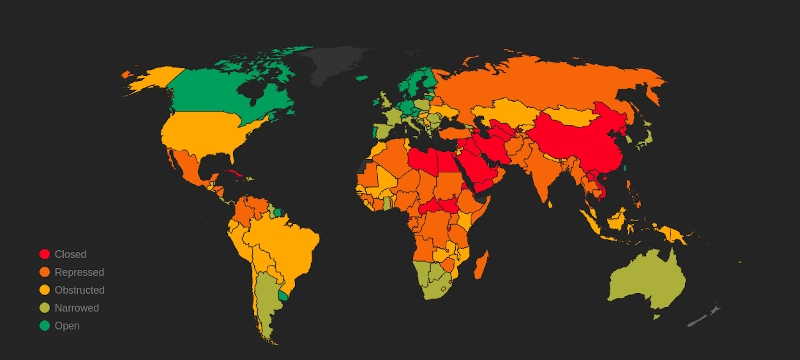Civic space blocked in Nepal: CIVICUS report
KATHMANDU, DECEMBER 8
In Asia, the assault on civil society and fundamental freedoms has persisted amid the global pandemic. Data released today by the CIVICUS Monitor shows that out of 25 countries in Asia, four — China, Vietnam, Laos and North Korea — are rated ‘closed ‘, nine ‘repressed ‘ and nine ‘obstructed ‘.
Civic space in South Korea and Japan is rated as narrowed, while Taiwan is the only country that is rated as open. People Power Under Attack-2020, an annual report from the CIVICUS Monitor, a global research collaboration that rates and tracks respect for fundamental freedoms in 196 countries, shows that basic freedoms are backsliding across the globe: 87 per cent of the world’s population now live in closed, repressed or obstructed countries.
“Our research shows that civic freedoms, including the freedoms of expression, assembly and association, continue to be violated across the region. The percentage of people living in Asian countries with closed, repressed or obstructed civic space is nearly 90 per cent,” said Josef Benedict, Asia-Pacific Civic Space Researcher for CIVICUS.
In Nepal, civic space is rated as ‘obstructed ‘. The CIVICUS Monitor has documented ongoing threats and attacks against journalists in Nepal for their reporting, including on the COVID-19 pandemic.
Online defamation laws, such as the Electronic Transactions Act, were used in 2020 to silence criticism of authorities and to prosecute online journalists.
According to the report, over the year, there have been further attempts by the authorities to impose new restrictions on the internet and the media. Civil society pushed back on a Media Council Bill that gave sweeping powers to the self-regulatory body overseeing the press in Nepal.
A new Public Service Broadcasting Bill has raised serious concerns among journalists and lawmakers about the potential for government control over a new public media body. An Information Technology Bill designed to replace the Electronic Transactions Act is inconsistent with international law and standards and risks creating a chilling effect giving rise to self-censorship.
Protesters have also been detained and protests have been met with excessive force.
In January 2020, more than a dozen activists, including members and staff of Amnesty International Nepal, were detained after they protested against the nomination of Agni Sapkota as Speaker of the Federal Parliament.
In June 2020, protests expressing discontent with the COVID-19 response were met with excessive force and arrests.
Human rights groups in Nepal remain concerned about proposed legislation to regulate social organisations that could constrain civil society. They have called on the government to protect the right to freedom of association.
According to the report, the top violations of political and civic freedoms in the region include the use of restrictive laws to criminalise human rights defenders and opponents, censorship, the harassment of activists and critics, and crackdown on protests. Across Asia, the authorities are using draconian laws to undermine fundamental freedoms and stifle dissent.
Laws related to national security, public order and criminal defamation are most commonly used to silence opposition. In at least 16 countries, human rights defenders were prosecuted.
Censorship is another major threat to civic and democratic freedoms in Asia.






